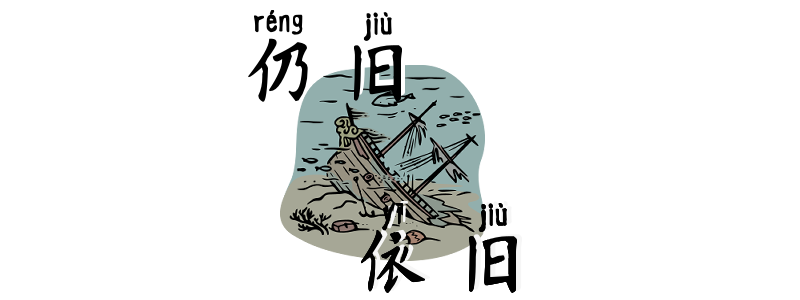Grammar Point:
In Chinese, both 仍旧 réngjiù and 依旧 yījiù mean “still” or “as before,” but they are used slightly differently in terms of nuance, formality, and context.
Structure
S + 仍旧 réngjiù + Adj or V
Common in both spoken and written language, though it leans slightly more formal. It often emphasizes the continuation of something despite expectations or time passing.
十年了,我的中文仍舊不好十年了,我的中文仍旧不好
It’s been ten years, and my Chinese is still not good.
他已經道歉很多次了,你仍舊不願意原諒他嗎?他已经道歉很多次了,你仍旧不愿意原谅他吗?
He’s already apologized many times. Do you still refuse to forgive him?
情況仍舊沒有改變情况仍旧没有改变
The situation is still unchanged.
我仍舊記得你說過的每一句話我仍旧记得你说过的每一句话
I still remember every word you said.
雖然中了彩券變成千萬富翁,她仍舊每天上班虽然中了彩券变成千万富翁,她仍旧每天上班
Even though she won the lottery and became a multimillionaire, she still goes to work every day.
S + 依旧 yījiù + Adj or V
More common in written or poetic language. It’s used to evoke a sense of sentimentality or timelessness.
她的笑容依舊燦爛,你的中文也依舊很爛她的笑容依旧灿烂,你的中文也依旧很烂
Her smile is still as radiant as ever, and your Chinese is still as bad as ever.
他依舊是那個老樣子他依旧是那个老样子
He’s still the same as before.
這次他依舊選擇了沈默这次他依旧选择了沉默
This time, he still chose to remain silent.
儘管我離開紐約多年,依舊懷念著那裡的貝果尽管我离开纽约多年,依旧怀念着那里的贝果
Even though I left New York years ago, I still miss the bagels there.
時光飛逝,山河依舊时光飞逝,山河依旧
Time flies, but the mountains and rivers remain the same.
Comparison
To be honest, there’s no significant difference in meaning, so they can be used interchangeably in most sentences. The choice really depends on personal preference.
| 仍旧 réngjiù | 依旧 yījiù | |
|---|---|---|
| Meaning | Still, as before | Still, unchanged |
| Tone | Neutral or persistent | Nostalgic or poetic |
| Context | Everyday or formal usage | Literary, poetic, emotional |
- “Still” in Chinese 1 – 还 hái (HSK 2)
- “Still” in Chinese 3 – 依然 yīrán (HSK 5)


